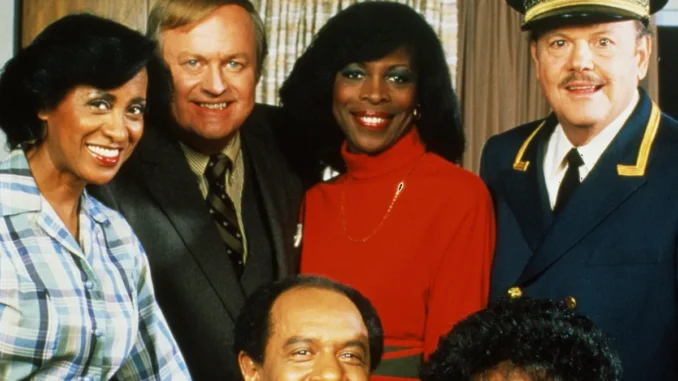
History of TV: Live, in front of a studio audience ‘The Jeffersons’
1975 signified the popularity of Betamax, VHS tapes and a turning point in American television: The Jeffersons. Its predecessor, Good Times (created by actor Mike Evans, writer Eric Monte and producer Norman Lear), featured a Black family from the projects in Chicago and became the first Black family on television. They even had the privilege of bringing Janet Jackson into the cast in 1977). Meanwhile, The Jeffersons offered a new perspective about a Black family who were “moving up in the world” and examined everything that inherently meant.
Apparently the prolific Emmy® award-winning writer-producer and human rights activist Norman Lear wrote the character of George Jefferson specifically for Emmy-nominated actor Sherman Hemsley. The show’s larger concept was inspired by members of the Black Panthers who approached Lear as fans, remarking that “Every time you see a Black man on the tube, he is dirt poor, wears shit clothes, can’t afford nothing,” as Lear stated in his autobiography.
At 253 episodes spanning 11 seasons, The Jeffersons claims the crown as one of television’s longest-running sitcoms.
The next-door neighbors
While George (Hemsley) and Louise Jefferson (Isabel Sanford) had originally been neighbors of the infamous Bunkers in All in the Family, now that they’d moved to the Upper East Side from Queens in their own spin-off. They also gained a new set of friends, including Helen (Roxie Roker) and Tom Willis (Franklin Cover), an interracial couple that was a revolutionary pairing for the 1970s silver screen. There’s even a kiss at the end of the very first episode that I’m positive had its audience spinning back in the 70s. It’s played as a private moment between husband and wife working out their differences, highlighting a deeper level of cultural understanding.
Helen and Tom’s daughter, Jenny (Berlinda Tolbert), dates and later marries Lionel Jefferson (played by Mike Evans —the same Mike Evans as co-created Good Times — and then Damon Evans, no relation).
Rounding out the cast of characters is George’s mother (Zara Cully), their slightly odd British neighbor Harry Bentley (Paul Benedict) and maid Florence Johnston (Marla Gibbs) who received her own spin-off that only lasted four short episodes. While this core cast expands and changes over the show’s run, what remains steadfast is the comedic pairing of the refined, down-to-earth and lovely, Louise with George who is an obstinate, crass, and snobby man. They play off each other well as characters and as actors; George’s more off-putting traits are balanced by Louise, who he often refers to as his “Weezy”, and his son Lionel. George was smart to trade in settlement money to buy a dry cleaning store that he turned into a chain — a move that sets up the engine for the show, allowing their upward mobility.
The serious side of comedy
Racism is acknowledged front and center in The Jeffersons pilot when characters use two derogatory terms in the heat of a (still comedic) fight. Meanwhile, class is woven in through the show’s maid storyline. Both are addressed in that unique way comedy has of teaching without preaching. The show went on to also explore alcoholism, suicide, gun control, transgender issues, the KKK, and adult illiteracy. It’s heavy stuff for a sitcom, but The Jeffersons clearly had the right formula to make it work, as well as an audience ready to absorb the bits of drama — and their real-life implications — with the comedy.
The accolades
The Jeffersons earned 14 Primetime Emmy nominations across the acting categories for Sanford, Gibbs and Hemsley, with Sanford winning Outstanding Lead Actress In A Comedy Series and the show for Outstanding Video Tape Editing For A Series.
It also received several Golden Globes and Humanitas Prize nominations, along with two Image Awards (NAACP) wins for Hemsley and Gibbs respectively.
